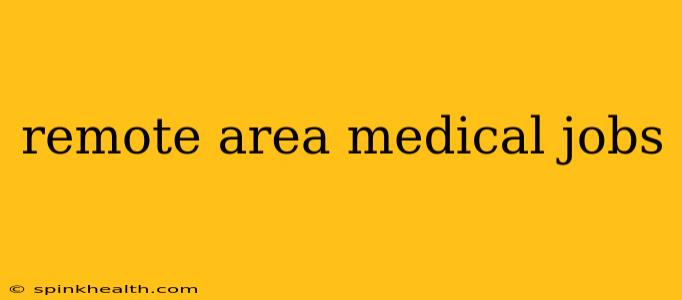Answering the Call of the Wild: A Guide to Remote Area Medical Jobs
The allure of untouched wilderness, the satisfaction of providing critical care where it's needed most – these are just some of the draws for those considering remote area medical jobs. But the reality of working in these challenging environments goes beyond breathtaking scenery. It demands resilience, adaptability, and a deep commitment to serving underserved populations. This journey into the heart of remote healthcare explores the realities, rewards, and requirements of these unique roles.
My name is Dr. Evelyn Reed, and for the past 15 years, I've dedicated my career to providing medical care in remote and underserved communities across the globe. I’ve seen firsthand the incredible impact we can have, as well as the challenges that come with such a demanding career path.
What Types of Medical Jobs Exist in Remote Areas?
The range of opportunities in remote area medicine is surprisingly diverse. It's not just about being a doctor; many healthcare professionals are essential to these teams.
- Physicians: From general practitioners and family medicine specialists to specialists in areas like emergency medicine, OB/GYN, and pediatrics, physicians form the backbone of remote healthcare.
- Nurses: RNs and LPNs are crucial for patient care, administering medications, monitoring vital signs, and providing essential support to physicians.
- Nurse Practitioners (NPs) and Physician Assistants (PAs): These advanced practice providers often play significant roles in diagnosing and treating patients, especially in areas with limited physician access.
- Medical Technicians and Assistants: From lab technicians to paramedics and EMTs, these professionals provide critical support for the smooth running of medical facilities and emergency response.
- Public Health Professionals: These individuals play a vital role in disease prevention, health promotion, and community outreach, ensuring the long-term well-being of remote populations.
What are the Challenges of Working in Remote Areas?
The idyllic image of remote area medical work often overlooks the significant challenges:
- Isolation and Loneliness: Long stretches away from family and friends are common, impacting mental and emotional well-being.
- Limited Resources: Access to advanced equipment, specialized medications, and even basic supplies can be severely limited. Problem-solving and resourcefulness are key.
- Difficult Working Conditions: Extreme weather, challenging terrain, and limited infrastructure can make even simple tasks demanding.
- Cultural Differences: Understanding and respecting the cultural norms and beliefs of the community is vital for successful healthcare delivery.
- Safety Concerns: Remote locations can pose safety risks, from wildlife encounters to potential security issues.
What are the Qualifications Needed for Remote Area Medical Jobs?
The specific requirements vary based on the role and location, but several common threads exist:
- Extensive Training and Experience: Most roles demand years of experience and advanced training.
- Strong Clinical Skills: The ability to diagnose and treat a wide range of conditions with limited resources is essential.
- Adaptability and Resourcefulness: The ability to overcome challenges with creativity and resourcefulness is critical.
- Cross-cultural Communication Skills: Working with diverse populations requires sensitivity and effective communication.
- Physical and Mental Resilience: The demanding nature of the work necessitates exceptional physical and mental stamina.
How Do I Find Remote Area Medical Jobs?
Finding these positions requires proactive searching:
- Specialized Recruitment Agencies: Many agencies specialize in placing healthcare professionals in remote locations.
- Non-Governmental Organizations (NGOs): Organizations like Doctors Without Borders and Samaritan's Purse often have openings for medical professionals.
- Government Agencies: Public health agencies and departments of health in countries with remote areas may offer employment opportunities.
- Online Job Boards: Websites like Indeed, LinkedIn, and specialized healthcare job boards often list remote area positions.
What are the Rewards of Working in Remote Area Medicine?
Despite the challenges, the rewards are immense:
- Making a Real Difference: The impact of providing vital healthcare to underserved communities is profoundly rewarding.
- Personal Growth and Development: The experiences gained foster resilience, adaptability, and a deep sense of purpose.
- Unique and Exciting Work: The variety and challenges of the work keep it engaging and stimulating.
- Opportunity for Adventure and Exploration: Working in remote locations often allows for exploration and discovery.
- Strong Sense of Community: Working alongside dedicated colleagues fosters a strong sense of camaraderie and shared purpose.
The path to a remote area medical job is demanding, but for those with the passion, resilience, and skill, the rewards are unparalleled. It's a career that tests your limits, broadens your horizons, and leaves an enduring legacy on the lives of those you serve.

